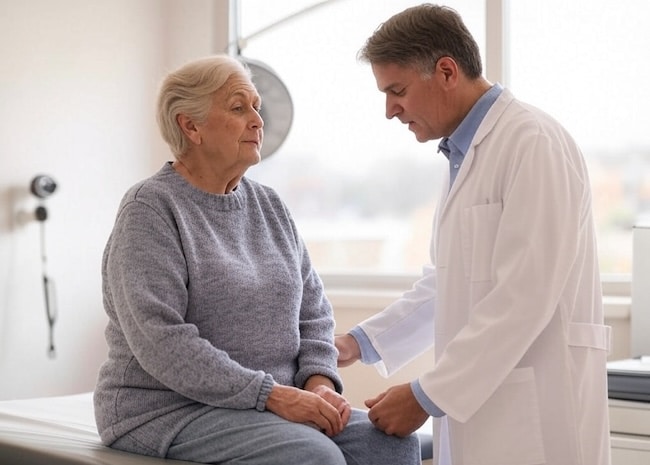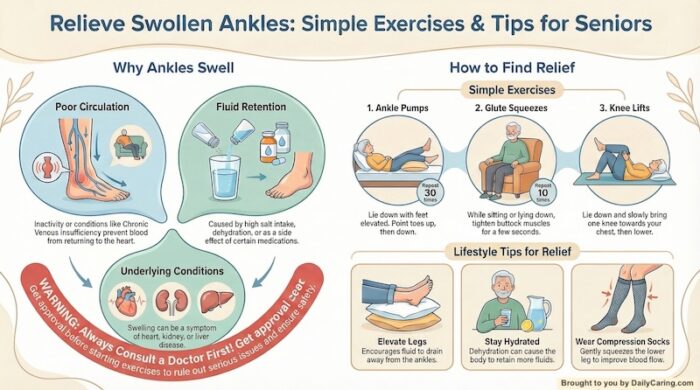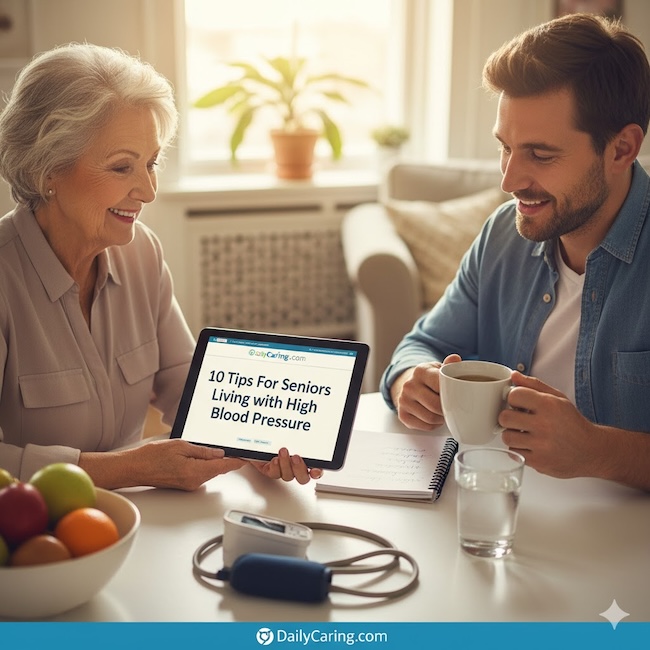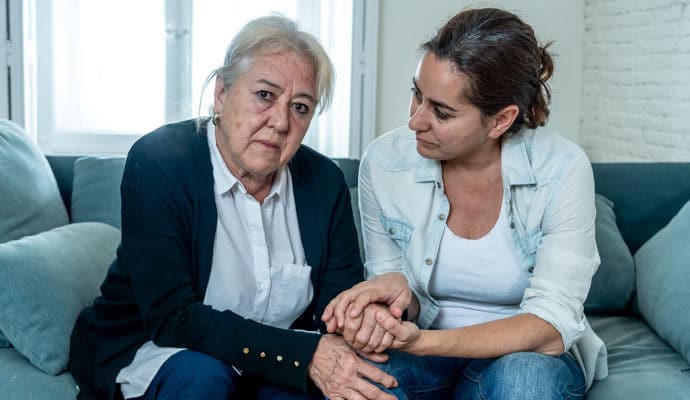Swollen ankles are a common but frustrating problem for many older adults. They often cause discomfort and make everyday movement difficult. Whether due to poor circulation, medication side effects, or underlying health conditions, edema (fluid retention) shouldn't be ignored. The good news is that relief is often within reach.
This article will share therapist-approved strategies to reduce swelling, from simple leg exercises to dietary tweaks, plus warning signs that warrant medical attention. Because every aging adult deserves to stay mobile and comfortable, we've focused on safe, practical solutions that can be incorporated into daily routines.

Swelling and Edema in the Legs are a Concern
Many older adults experience swollen ankles and legs.
This can make moving around more difficult, increase fall risk, and make the lower body feel uncomfortable and heavy.
We explain the causes of swollen ankles and legs, what to do before starting any exercises, lifestyle changes that can help, and how specific exercises can help.
We also share three home exercises in a 7-minute video from Bob and Brad, the Famous Physical Therapists, that help with swollen ankles, legs, and feet.
Causes of Swollen Ankles in Seniors
Ankles, lower legs, and feet swell when the body retains fluid in the lower legs, ankles, and feet.
It’s called edema, and it usually occurs on both sides of the body and is common in older adults.
This type of swelling in the extremities can also indicate a serious underlying health condition.
Edema can be caused by a variety of different causes, including:
- Congestive heart failure and other heart conditions
- Chronic kidney disease
- Vascular conditions
- Rheumatoid arthritis
- After surgery, when the body is healing
- Inactive or sedentary lifestyle
If swelling only occurs on one side of the body, contact a doctor immediately. It could be deep vein thrombosis (a blood clot), which requires immediate medical treatment.
Video: Top 3 Exercises for Leg Lymphedema (Swelling or Edema)
How to Prepare for an Exercise Routine to Get Rid of Swollen Ankles
Before beginning any exercises to reduce swelling in the ankles or legs, it’s essential to check with an aging adult’s doctor to identify the underlying cause and get their approval to exercise the area.
Moving fluid out of the legs and into the center of the body to be eliminated could put extra stress on the body, especially for people with heart or kidney conditions.
For example, it might be dangerous to reduce leg swelling through exercise if it worsens a heart condition.
The goal is to improve overall health and comfort safely.
Lifestyle Changes Can Reduce Swelling in Ankles, Legs, and Feet
Potential solutions that can help reduce swelling include:
- Wearing compression socks or compression stockings.
- Make sure the shoes aren’t too tight.
- Elevating the legs helps gravity improve circulation.
- Staying hydrated may sound counterintuitive, but dehydration can cause the body to retain more fluids.
- Eating more magnesium-rich foods like nuts, seeds, legumes, whole grains, and leafy greens.
- Increasing overall movement and exercise – sitting or standing in one place for too long can increase swelling. Even moving knees and flexing ankles can help.
- Limit intake of salt and carbohydrates.
- Epsom salt baths (or soaking legs in an epsom-salted tub of water) for 15-20 minutes – not scientifically proven, but many people say it’s effective.
- Losing excess weight.
VIDEO: How to Reduce Swollen Ankles in Aging Adults
Simple Home Exercises Can Help Reduce Swelling In Legs and Ankles
We found some simple home exercises that work against gravity and help the body pump fluids up from the feet and back into the trunk (center area) of the body.
Once the fluid is in the upper body, the kidneys process it and eliminate it in urine.
Because these exercises help the body eliminate excess fluid, your older adult might need to use the bathroom more frequently.
INFOGRAPHIC: How to Find Relief From Swollen Ankles

3 Simple Home Exercises for Swollen Legs and Ankles
Famous Physical Therapists Bob Schrupp and Brad Heineck demonstrate and explain three simple home exercises that relieve swelling in legs and ankles.
As with any exercise, starting slowly and increasing over time is always best to prevent injuries or discomfort.
Exercise 1: Ankle Pumps
Lie down and elevate your feet. Moving only your feet, point your toes toward your head and then away from your head.
Go back and forth and aim for 30 repetitions, 3 times daily.
This exercise is best done while lying down, but it can also be done while seated. To make it a little more effective while seated, elevate the feet with a stool.
Another senior-friendly alternative (2:48 in the video) is to tap your toes like you would while tapping along to a song. It might even be fun to play some toe-tapping music to make it more fun.
Exercise 2: Butt Squeezes
While sitting or lying down, tighten the glutes (butt muscles) – as if trying to pick up a quarter that’s between the butt cheeks 🙂
Go slowly and try to hold the squeeze for a few seconds, then release and relax for a few seconds before the next squeeze.
While doing this exercise, ensure your older adult doesn’t hold their breath. They should breathe slowly and deeply.
Aim for 10 of these squeezes, 3 times a day.
Exercise 3: Single Knee to the Chest
While lying down, bring one knee to the chest, then return the leg to the flat position. Keep the other leg flat or bent with the foot on the bed to take pressure off the back.
After finishing the exercises with one leg, switch to the alternate leg.
They don’t specifically mention how many repetitions to do. Ten repetitions per side, three times a day, seems reasonable, but use your judgment to see what works best for your older adult.
Final Thoughts on Eliminating Swollen Ankles in Seniors
It's easy to dismiss gentle movements as ineffective, especially when dealing with stubborn swelling. But the power of these exercises isn't in their intensity, it's in their precision. They are specifically designed to activate your body's natural circulation system, the calf muscle pump.
Think of your calf muscles as a second heart for your legs; with each simple ankle flex and circle, you're essentially squeezing the veins and pushing stagnant fluid and blood upward, fighting back against gravity's constant pull. This isn't just about temporary relief; it's about giving your body the daily tool it needs to proactively manage fluid buildup.
Next Steps: Get a clear demonstration of these 3 simple home exercises to get rid of swollen ankles
Recommended for you:
- Chair Pilates for Seniors: 5 Routines Build Strength and Flexibility
- 5 Top Seated Workout Questions and 3 Simple At-Home Seated Exercises
- 5 Safe Balance Exercises for Seniors Who Use a Walker
This article contains affiliate links. We never link to products or services for the sole purpose of making a commission. For more information, see How We Make Money.
About the Author

Connie is the founder of DailyCaring.com and was a hands-on caregiver for her grandmother for 20 years. (Grandma made it to 101 years old!) She knows how challenging, overwhelming, and all-consuming caring for an older adult can be. She also understands the importance of support, especially in the form of practical solutions, valuable resources, and self-care tips.














Interesting comments. My ankles have become more swollen in the past few days. I am 84 and on 20 Prescribed meds per day. I am not able to stand for very long needing to sit to prepare meals, wash up etc. I am able to do most things ie. Shop, drive etc but tire easily. SOB has been constant for decades. Kind regards.
Thanks for sharing your experience! It might be helpful to contact your doctor to find out if the increased swelling is anything to be concerned about.
Do you have information on palliative care ?
We’ve got several articles about palliative care here:
– Could Palliative Care Improve Your Senior’s Quality of Life? https://dailycaring.com/could-palliative-care-improve-your-seniors-life/
– How Palliative Care Improves Seniors’ Quality of Life https://dailycaring.com/palliative-care-improves-seniors-quality-of-life/
– 9 Top Questions About Palliative Care vs. Hospice Care https://dailycaring.com/9-top-questions-about-palliative-care-vs-hospice-care/
Swelling of my feetis first experience, being not aware of these exercises,tried lying raise one leg and firmly with both palmes of my hand tried to move the swelling away up,did note reduction and have been doing it for about 4/5 days. it returns .
Am 86 active ,like regular long walk, body massage/streching and weights, play Tennis ,cycling to have enough body move. Will do these exercises, hopefully it should work. Thanks for your help.
It’s essential to let your doctor know about the swelling in your feet and ask for their recommendation. It could be a symptom of a health condition that requires medical treatment or lifestyle changes.
My name is Tracey. I’ve just had open heart surgery, last year feeling fine but having trouble with my calves and ankles swelling, I’m carry fluid in my legs I would like some advise how to get rid and get back to normal living. They really do hurt.
It’s essential to let your doctor know about the swelling and pain in your legs and ask for their recommendation. It could be a symptom of a health condition that requires medical treatment or lifestyle changes.
I just started getting swollen ankles. My heart is fine as I’ve just had tests. I’m putti g down to just turning 65 so getting on! an d weight gain us inactivity since covid. I hope these exercises, weight management an starting walking will cure things. Will let you know😊
It’s wise that you got a doctor’s checkup to make sure there aren’t any underlying health conditions causing the swollen ankles. It sounds like you’ve got a great plan for lifestyle adjustments that will hopefully help!
Please send me the exercises these people are talking about for edema. Thank you.
The exercises above are available to watch for free on YouTube. We found some great gentle exercise videos available for purchase on Amazon at https://amzn.to/49fSbgM
i am so relievedafter reading your comments i will follow your advice and see how i get on . i should remember my spelling i before e exept after c i am 94 so excuse the memory loss . it is wonderfull you being here to give your help, yours sincerly beryl sayles x
So glad this article is helpful!
I’ve been doing these same exercises for years before getting
Out of bed. No problems and perhaps that’s why!😊
That’s wonderful!
Thanks
So glad this is helpful!
Thank you very much for your good advice it is very appreciated
You’re welcome! We’re so glad these exercises are helpful.
Thank you I have swollen right ankle so those exercises are great for me. Thanks so much.
You’re welcome, we’re so glad these exercises are helpful!
I have my elderly dad and his legs are swollen. What am I supposed to administer to him
It’s essential to let your dad’s doctor know about the swelling in his legs and ask for their recommendation. It could be a symptom of a health condition that requires medical treatment or lifestyle changes.
My feet and ankles were swelling each day after getting out of bed. I now can start in reducing the problem using the exercise program you suggest. Thanks
We’re so glad these exercises are helpful. It’s also wise to let your doctor know about the swelling in case that’s a sign that you have an underlying health condition that requires treatment.